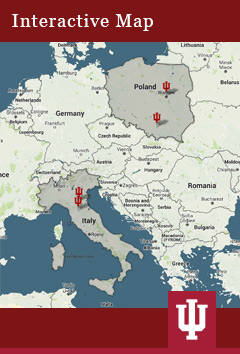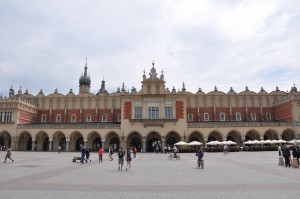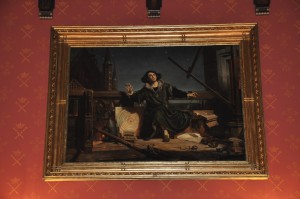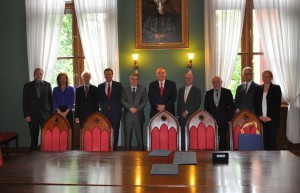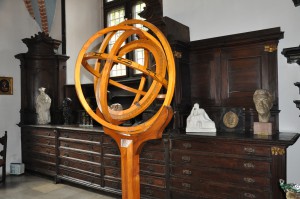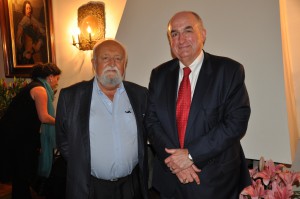A celebration of history, education and culture in Krakow
After a whirlwind four days in Florence and Bologna, members of the IU delegation were almost instantly re-energized when they touched down in Krakow, Poland, and commenced the second leg of this one-week, two-nation trip.
Krakow is nothing short of breathtaking. One of Poland’s oldest cities, dating back to the seventh century, it’s often cited as one of Europe’s most beautiful cities. Krakow’s stunning skyline reflects a combination of Gothic, Renaissance and Baroque architecture. As we stood in the middle of the city’s Rynek Glowny, the main market square of old-town Krakow and one of the largest medieval town squares in Europe, it was impossible not to be captivated by the centuries-old structures surrounding us.
I, for one, frequently found myself playing catch-up with the rest of the delegation, paralyzed by both the majesty of Cloth Hall, the square’s dominant rectangular icon, and the beauty of St. Mary’s Basilica — a Brick Gothic church built in the 13th century and famous for its Veit Stoss altarpiece, the largest Gothic altarpiece in the world. [Another personal aside — part of my heritage is Polish, with my great-grandparents having once inhabited a small town in southeastern Poland not far from Krakow. Sadly, I know but a few Polish words, but it’s already been wonderful to learn a little more about my family’s cultural makeup.]
Situated on the banks of the Vistula River, the longest and largest river in Poland, Krakow features a rich and unusual history. In its earliest centuries (1038-1569), it served as the capital of the Crown of the Kingdom of Poland. Many years later, after Germany’s invasion of Poland in 1939, it was proclaimed the capital of Germany’s General Government, effectively preserving the architectural core of the city when most of Poland’s major cities, including Warsaw, were utterly devastated. By the end of the war, in 1945, when the Russian army removed the Nazis from Krakow with little resistance from the fleeing enemy, the city’s structures were again spared.
Today, Krakow, with a population of about 800,000 people, is considered one of Poland’s most important academic, artistic and cultural centers and an economically dynamic hub of Poland and Eastern Europe.
Krakow: A center of the academic universe
Krakow is also home to Jagiellonian University, one of the oldest and most respected universities in the world. Founded by King Casimir III the Great in 1364, it grew to prominence in the Middle Ages and the Renaissance, and its educational offerings, particularly those in astronomy, law, mathematics, drew many of the best scholars from across Europe. One of the most notable of those scholars was Nicolaus Copernicus, the legendary Renaissance mathematician and astronomer who developed the model of the university placing the Sun, rather than the Earth, at the center of the universe.
In 1918, after the end of World War I, Poland regained its independence after being ruled for many years by its neighboring countries, thus accelerating the development of Jagiellonian University. More than 4,000 young people came to the university to study in this post-war period, but that growth came to a halt with the outbreak of World War II and Nazi occupancy of Poland. On Nov. 6, 1939, the Nazis arrested nearly 200 members of the university faculty and sent them to a concentration camp. In response, a secret school, involving about 800 students, began in 1942. Karol Wojtyla, later Pope John Paul II, was one of these students.
Following the war’s end, the university was forced to respond to a new communist reality in Poland, which resulted in several decades of student protests against the ruling regime.
Since the collapse of communism in Eastern Europe in 1989, Jagiellonian University has undergone a dramatic rebirth and revival. Over the last 25 years, the university has established new schools in biochemistry, biophysics and biotechnology, and in international and political studies. Today, the university features 15 schools and three medical schools that serve approximately 50,000 students, slightly more than IU’s Bloomington campus.
On this day, the university provided a most majestic setting for a productive meeting between members of the IU delegation, led by President Michael A. McRobbie, who is making his first visit to Poland, and top administrators from Jagiellonian University, including President Wojciech Nowak.
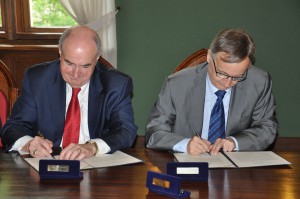
IU President Michael A. McRobbie and Wojciech Nowak, president of Jagiellonian University, renew a partnership agreement between their respective institutions.
Joining the IU delegation here in Krakow on Monday was a prominent figure to many Poles: Lee A. Feinstein, former U.S. ambassador to Poland from 2009 to 2012 and founding dean of the IU School of Global and International Studies. While serving in Poland, Feinstein helmed one of the largest U.S. embassies in the European Union. During his tenure, he signed an agreement to establish a U.S. Aviation Air Force Detachment in Poland, the first permanent U.S. military presence in the country. In October 2012 in Warsaw, President Bronislaw Komorowski awarded him the Commander’s Cross with the Star of the Order of Merit “for his outstanding contributions to Polish-American relations by strengthening cooperation between the Republic of Poland and the United States.”
The stately conference room in which the IU and Jagiellonian officials came together had all the air of a diplomatic meeting, but with little need for any difficult negotiation. IU and Jagiellonian have had a positive and productive relationship dating back more than 30 years and a formal institutional partnership since 1997 involving both faculty and graduate student exchanges. Since 2009, those exchanges have taken place across a wide range of academic disciplines, including music, Slavic languages and literature, and law.
In addition to signing a renewed agreement between their respective institutions, the meeting participants explored a number of potential new collaborative activities toward the goal of expanding faculty and student exchanges. Hannah Buxbaum, wearing dual hats as John E. Schiller Chair in Legal Ethics at the IU Maurer School of Law and academic director of the new IU Europe Gateway office in Berlin, discussed building upon a successful partnership between the Maurer School and Jagiellonian University’s Faculty of Law and Administration, its oldest academic unit. She also talked about how the new gateway office, designed to be a central hub for IU activities across Europe, could help link more IU and Jagiellonian faculty and students.
McRobbie, Feinstein and Vice President for International Affairs David Zaret then took turns speaking about other interesting partnering opportunities, as well as major recent education and research initiatives at IU, such as the establishment of the School of Global and International Studies, a new program in intelligent systems engineering in IU’s School of Informatics and Computing and IU’s Grand Challenges research program. For his part, Feinstein specifically addressed the importance of strengthening IU students’ understanding of Poland’s central relationship with and role in the modern European system.
At almost every turn, the conversation highlighted IU’s long and storied history of engagement in Poland and Eastern Europe. At a time of fundamental political and social transformation in Eastern Europe, IU became actively involved with the study of Poland and helped to establish the American Studies Center in Warsaw and the Polish Studies Center at IU Bloomington in 1976. This led to IU establishing academic programs with Jagiellionian University, as well as with the University of Warsaw, at a time when such formal exchanges between the two countries were rare due to the Cold War.
Maintaining the missions of the modern university
Following the renewal of the agreement between IU and Jagiellonian University, delegation members took part in a brief tour of the university campus and its more-than-650-year-old history. Among the many highlights of the tour were a plaque remembering the almost 200 Jagiellonian faculty members arrested by the Nazis on Nov. 6, 1939 (tragically, many died in the concentration camp); the Drzewo Wolnosci, or “Tree of Freedom,” commemorating Krakow becoming the first city in Poland to be set free after World War I; and a large rectangular room for major ceremonies that featured portraits of all the famous figures in university history, including Pope John Paul II and Copernicus.
Among the places Pope John Paul II and Copernicus both studied was a late-Gothic building known today as the Collegium Maius. One of Jagiellonian University’s oldest buildings, it has been in continuous use for more than 600 years. With a beautiful 15th-century courtyard bordered by arcades, the building — which many years ago housed some of the university’s faculty — currently serves as a museum that reflects the teaching, learning and research missions of today’s best universities.
Within its magnificently decorated walls are thousands of valuable artifacts showcasing the influential role the university has had in developing several major fields of modern academic study. From the time of Copernicus, the museum possesses a fascinating set of three medieval astronomical instruments, including a large celestial globe and an astrolabe, a tool to determine the position of stars and planets that was used for many centuries in astrology, astronomy, surveying, construction and navigation. In the Aula, a room decorated with more than 100 portraits of Polish kings, bishops and outstanding university presidents and professors, resides a stone portal from the former town hall of Krakow that is more than 400 years old.
One especially memorable area of the museum is the Green Room, which displays, among other artifacts, a mid-19th-century French piano and other souvenirs of the renowned Polish composer and virtuoso pianist and Fryderyk Chopin. [Also joining the delegation for part of its time in Krakow was internationally acclaimed Chopin authority Halina Goldberg, a musicologist at the IU Jacobs School of Music.] At one end of the Green Room is a portal, featuring the inscriptions of several dates, including Nov. 6, 1939, reminding visitors of dark times in Polish history. The dates are accompanied by a Latin motto that reads “Ne Cedat Academia” or “May the Academy Persist.”
A meeting with the maestro
From the Collegium Maius, delegation members returned to the main market square for a highly anticipated afternoon meeting with Maestro Krzysztof Penderecki, the eminent Polish composer and conductor, and his wife, Elzbieta, who is an impresario in her own right. She serves as president of the Ludwig van Beethoven Association and general director of the popular Ludwig van Beethoven Easter Festival, which just celebrated its 20th year.
Maestro Penderecki, who studied music at Jagiellonian University and the Academy of Music in Krakow, has been called Poland’s “greatest living composer.” He has composed a number of major works performed by choirs and orchestras all over the world. He has also received several prestigious awards, including the Commander’s Cross in 1964, the Prix Italia in 1967 and 1968, the Knight’s Cross of the Order of Polonia Restituta in 1964, three Grammy Awards in 1987, 1998 and 2001, and the University of Louisville Grawemeyer Award for Music Composition in 1992.
Early next year, IU and its world-renowned Jacobs School of Music will add to Maestro Penderecki’s honors by awarding him with an honorary doctorate in Bloomington. Preparations, led by former Ambassador Feinstein and Jacobs School Dean Gwyn Richards, are already underway for the maestro and Mrs. Penderecki’s forthcoming visit to the Jacobs School.
The distinguished couple couldn’t have been more charming, gracious and accommodating in hosting McRobbie, Feinstein and their fellow IU delegation members. Indeed, the meeting with the maestro provided a particularly fitting coda to a most memorable and inspiring day celebrating the history, education and culture of this exceptional city.
Next stop: Warsaw.
Tags: American Studies Center, Elzbieta Penderecki, Halina Goldberg, Hannah Buxbaum, IU Europe Gateway, IU Jacobs School of Music, IU Maurer School of Law, IU Polish Studies Center, IU School of Global and International Studies, IU School of Informatics and Computing, Jagiellonian University, Krakow, Lee A. Feinstein, Michael A. McRobbie, Poland, University of Warsaw

